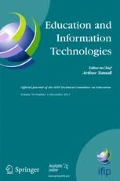Abstract
Nigeria is considered by many to be a cyber crime hot spot, and is often ranked among the world’s top cyber crime committing countries (e.g. advanced fee fraud is also known as Nigerian scams and 419 scams—419 is a section under the Nigerian Criminal Code Act that prohibits obtaining goods by false pretences). We designed a cyber crime prevention programme based on the action research paradigm. We the used the pretest-postest quasi experimental design to evaluate the impact of the action cyber crime prevention programme on 218 Nigerian secondary school students’ attainment in Civic Education and Social Studies. The students were purposefully selected from whole classes in six secondary schools in Nigeria. Our analysis suggested that the action cyber crime prevention programme has a positive effect on students’ attainment in cyber crime prevention. Future work includes extending the Action Cyber Crime Prevention Programme to a wider audience in Nigeria and other developing countries.

Similar content being viewed by others
References
Abimbade, A. (1996). Computer assisted instruction and the teachers. Nigeria Journal of Computer Literacy., 1(1), 78–81.
Adepoju, O.M. (2009). Tertiary students’ perceptions of incidences of internet crimes in southwestern, Nigeria. Unpublished M.Ed Dissertation, University of Ibadan.
Adesina, A.D.O., & Adeyemi, B.A. (2007). Teaching to achieve social studies values: A case of re-education of teachers. Retrieved Oct. 10, 2010 http://www.deta.up.ac.za/.
Amosun, P. A., & Ige, O. A. (2009). A new breed of crime among in-school aged children in Nigeria. The African Symposium, 9(2), 90–98.
Aworanti, O. A., & Abimbola, I. O. (1997). The level of achievement on ecology concepts among Nigerian final-year secondary school students. Journal of the Science Teachers’ Association of Nigeria, 32(1&2).
Comparative Education Study and Adaptation Centre (CESAC). (1993). Nigerian secondary schools social studies project. Book 1. Lagos: NERC.
Chiemeke, C. S., & Longe, O. B. (2007). Information and communication penetration in nigeria: Prospects, challenges and metrics. Asian Journal of Information Technology, 6(3).
Choo, K.K.R. (2008). Organised crime groups in cyberspace: A typology. Springer Science + Business Media, LLC.
Choo, K.K.R. (2011). The cyber threat landscape: Challenges and future research directions. Volume 30, Issue 8, pp. 719–731.
Comparative Education Study and Adaptation Centre. (1993). Nigeria secondary schools social studies project 1. Lagos: NERC.
Dees, J. (2009). Using bloom’s taxonomy to create lesson objectives. Retrieved Mar. 26, 2011 from www.thereligionteacher.com/using-bloom’s-taxonomy-to-create-lesson-objec.
Falade, D.A. (2007). Development of a participatory civic education package for secondary school students in Ondo State. (Unpublished Ph.D. Thesis) University of Ibadan.
Ige, O.A. (2008). Secondary students’ perceptions of incidences of internet crimes among school-aged children in Nigeria. Unpublished M.Ed Dissertation, University of Ibadan.
Internet World Stats (2013). Internet usage statistics for Africa (Africa internet usage and population stats). Retrieved 3 June 2013 from http://www.internetworldstats.com/stats1.htm.
Mansaray, A. & Ajiboye, J.O. (2000). Developing a participatory model in informal civic education for secondary students in rural and peri-urban area in Nigeria. A technical report submitted to USAID/OTI, Nigeria.
Mumford, E. (2006). The story of socio technical design: Reflections on its successes, failures and potentials. Info Systems J, 16, 317–342.
Murphy, D. (2009). Al qaeda ties of umar farouk abdulmutallab: How deep they go? December 28 Retrieved May 3, 2011 from http://www.csmonitor.com/world/global-news/2009/1229.
Nigerian Educational Research and Development Council (NERDC). (2007). UBE civic education curriculum. Abuja: Federal Government Press.
Nkire, F.O. (2011). Impact of participatory non-formal instructional programme on adult learners environmental knowledge, attitude and practices in Oyo State, Nigeria. A post-field seminar paper presented to the Department of Teacher Education, University of Ibadan, Ibadan.
Obidoa, A. (1991). A re-appraisal of liberal arts and social studies education in Nigerian schools in national secondary school curriculum review conference proceedings. Ibadan: Macmillan Nigeria Publishers Limited.
Okonigene, R. E., & Adekanle, B. (2009). Cyber crime in Nigeria. Business Intelligence Journal., 3(1), 15–17.
Oloko, O.O. (2011). Secondary school teachers’ perceptions of incidences of economic crimes among school-aged children and their critical thinking dispositions in Lagos State. A B.Ed project submitted to Department of Social Science Education, Adekunle Ajasin University, Akungba-Akoko.
Oyetade, E.M. (2003). Developing a participatory environmental education programme for colleges of education students’ in Lagos State. Unpublished Ph.D thesis. University of Ibadan, Ibadan.
Paulsen, C., McDuffe, E., Newhouse, W., & Toth, P. (2012). NICE: Creating a cybersecurity workforce and aware public. IEEE Security & Privacy, pp.76–79.
Pepe, J. (1984). Microcomputers in schools, 1983–1984: A comprehensive survey and analysis. Westport, CT: Market Data Retrieval.
Roberts, M. R. (2005). Curriculum development process. Northern Arizona: CTE. 592.
Seale, J. (2011). Doing student voice work in higher education: An exploration of the value of participatory methods. British Educational Research Journal, 36(6), 995–1015.
United States Department of Justice (US DoJ). Umar Farouk Abdulmutallab Sentenced to Life in Prison for Attempted Bombing of Flight 253 on Christmas Day 2009. Media release 16 February 2012 from http://www.justice.gov/opa/pr/2012/February/12-ag-227.html.
Acknowledgments
Our profound gratitude goes to the National White Collar Crime Center and the Federal Bureau of Investigation for providing the electronic copies of the Internet Crime Reports which provided a meaningful background for this research.
Author information
Authors and Affiliations
Corresponding author
Rights and permissions
About this article
Cite this article
Amosun, P.A., Ige, O.A. & Choo, KK.R. Impact of a participatory cyber crime prevention programme on secondary school students’ attainment in crime prevention concepts in civic education and social studies. Educ Inf Technol 20, 505–518 (2015). https://doi.org/10.1007/s10639-013-9298-0
Published:
Issue Date:
DOI: https://doi.org/10.1007/s10639-013-9298-0



